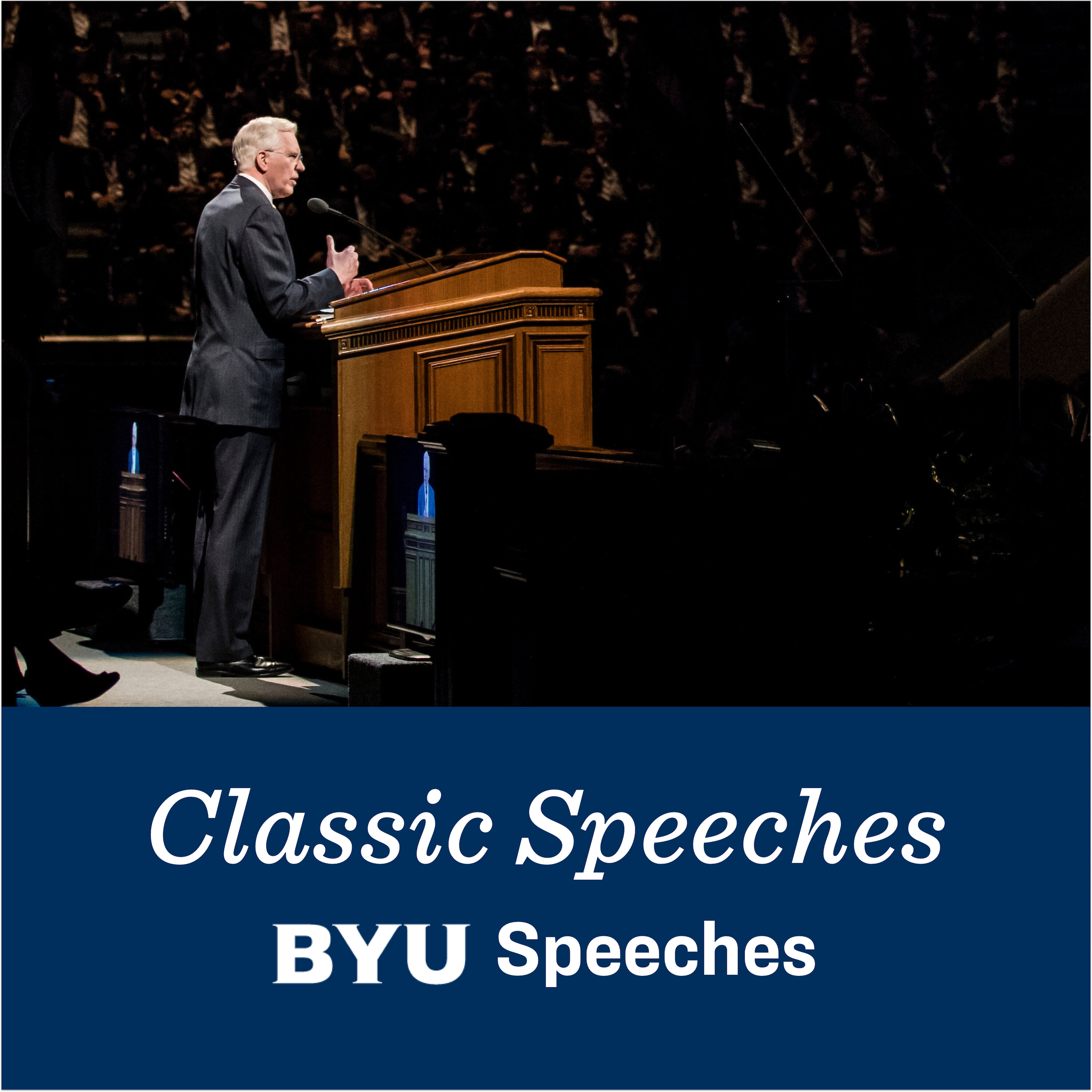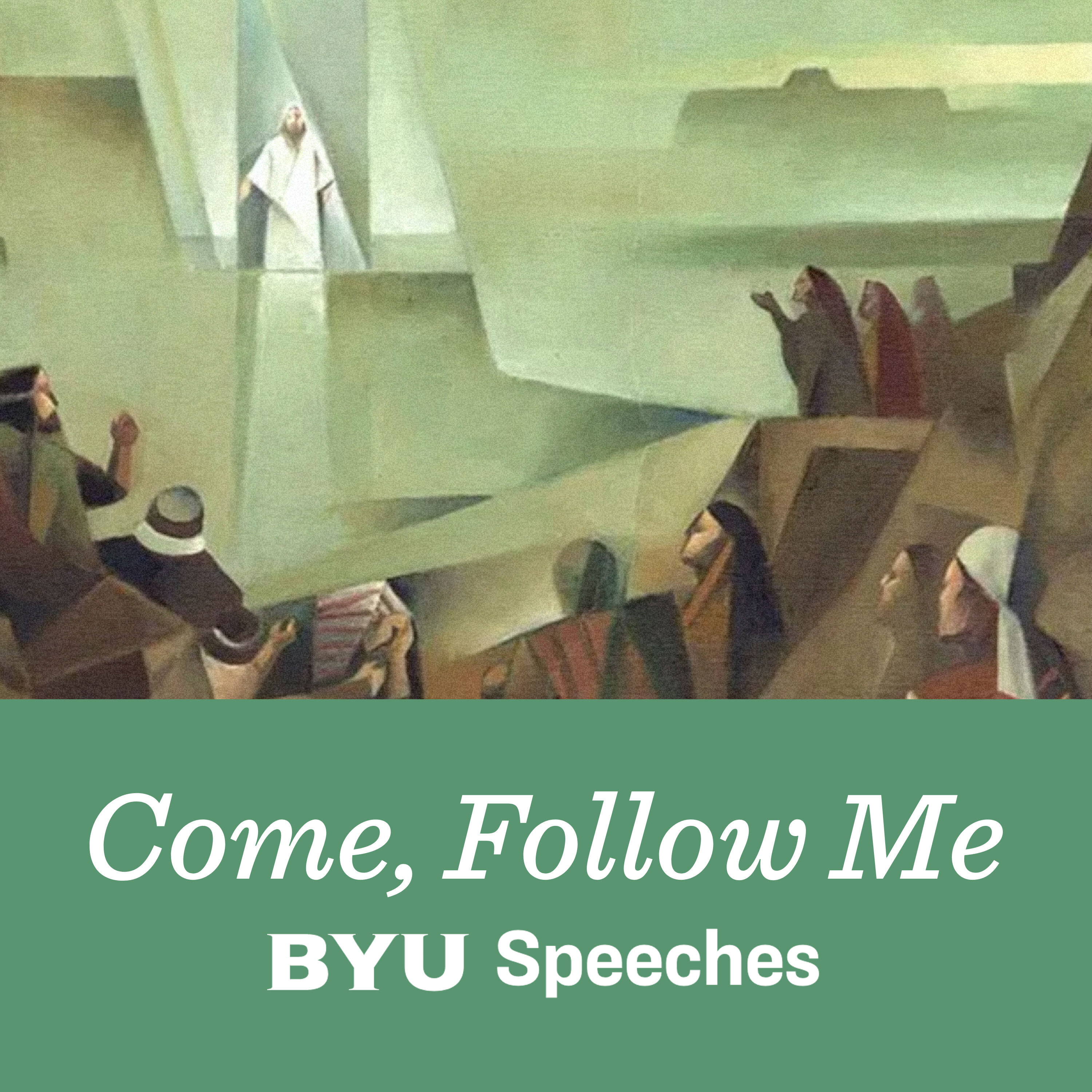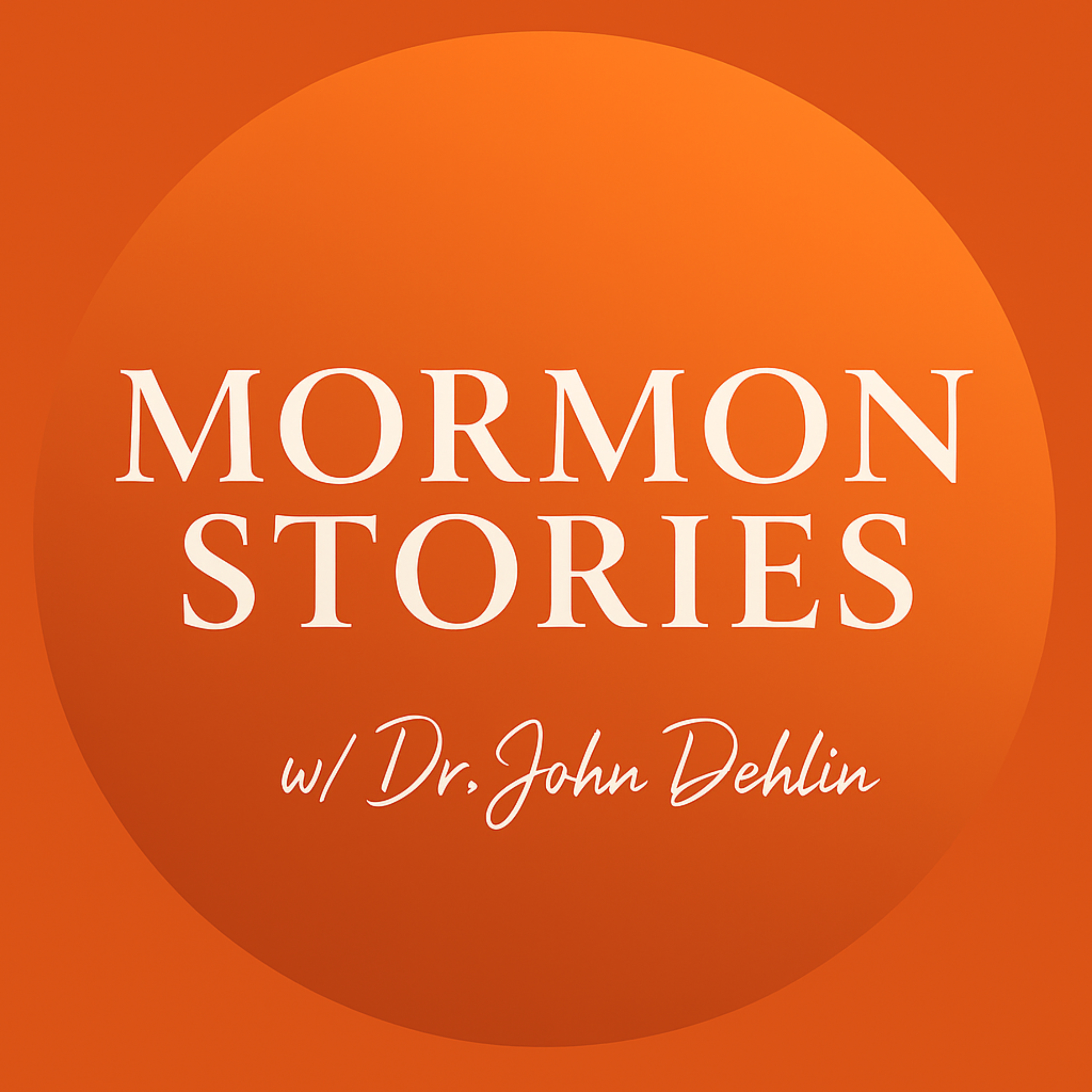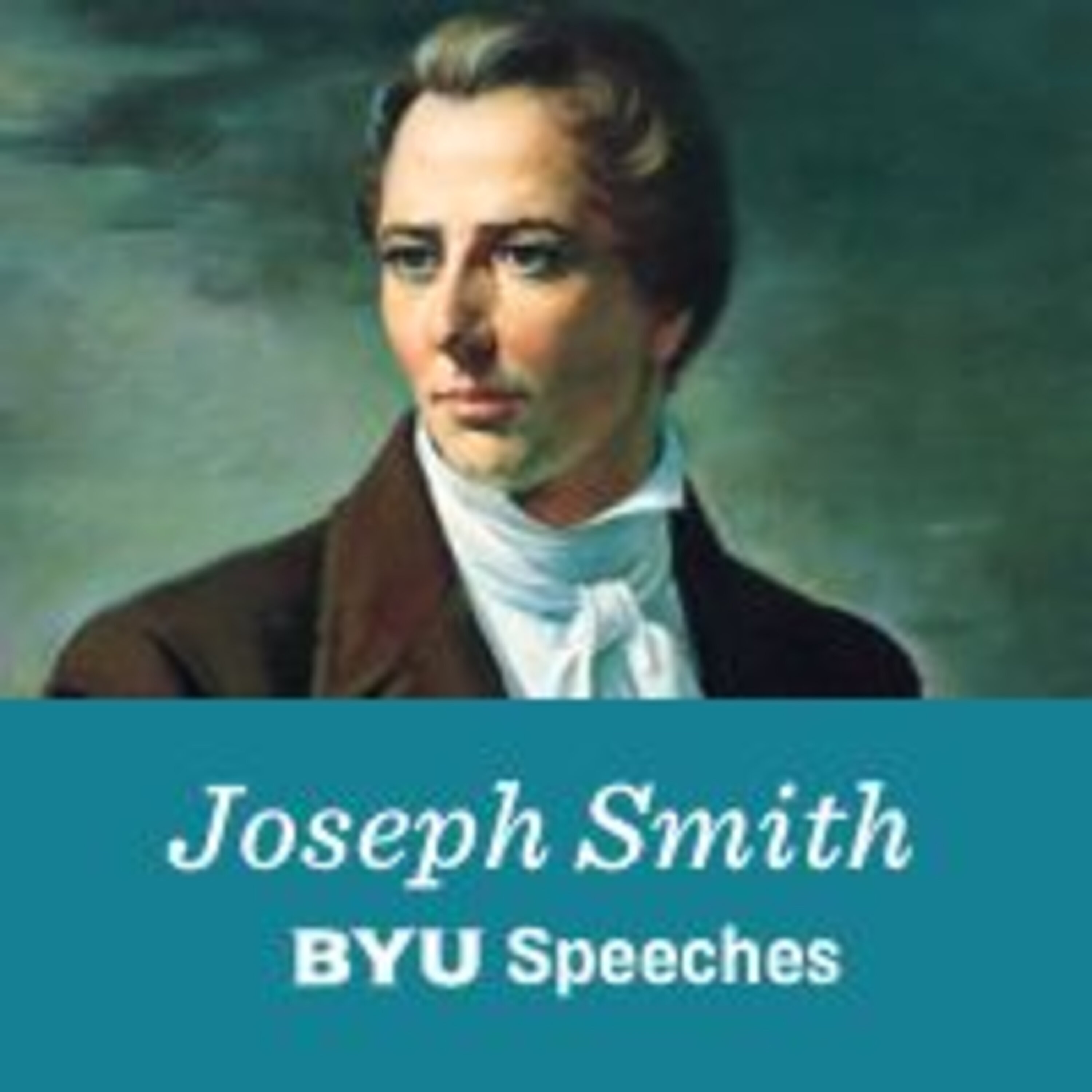.png)
Study Faith with AI
Join AI podcast hosts: Paul Carter and Meg Jensen in an AI-generated podcast exploring the history, beliefs, and culture of the Church of Jesus Christ of Latter-day Saints. We balance facts and faith as you search for truth.
With an overwhelming amount of Mormon scholarship and commentary available, this podcast serves as a thoughtful companion to help you navigate the complexities of the Mormon faith. Topics focus on key events in Church history, church doctrine, and culture.
Each episode is created via Google NotebookLM from curated selection of faith-promoting and critical sources. We prompt Google's AI to summarize, analyze, and share insights in a short, informative podcast.
Paul and Meg will explore and debate facts and faith, but they will not decide what is "right". Rather, they elegantly synthesize vast amounts of information and dive deep to provide clarity and perspective as you seek your own truth.
Tune in to explore faith through a modern, innovative lens.
Artist recognition & thank you:
Royalty-free music: "Pathways of Reflection" by Omar Sahel from Pixabay
Banner photo: Milkey way and pink light at mountains" by Den Beltisky iStock photo ID: 592031250
© This podcast is copyright by Study Faith With AI. 2025. All rights reserved.
Study Faith with AI
S7 E8 Did Joseph Smith Translate Anything Correctly?
Episode 8 of The Book of Abraham examines six case studies of Joseph Smith's translation work, including the Book of Mormon, the Joseph Smith Translation of the Bible, the Book of Abraham, his claims about the Adamic language, the Kinderhook plates, and the lost writings of John. We methodically present historical and scholarly evidence challenging the authenticity of each translation, highlighting inconsistencies, contradictions, and scientific findings that raise questions about Smith's abilities. The episode concludes with thoughtful advice for listeners who may be experiencing faith challenges, emphasizing the importance of personal discernment, education, and allowing space for both questioning and finding one's own authentic spiritual path.
Sources
- Video: Joseph Smith Translation Review and Analysis_Mormon Stories
- Video: Seer Stones_LDS
- Essay: The Characters Document_Ensign Peak
- Essay: The Characters_Joseph Smith Papers
- The Characters copied from Joseph Smith's gold plates
AI Prompt
Discuss and analyze Joseph Smith's credibility as a translator. Topics: Book of Mormon, Book of Mormon Charcters, The Book of Abraham, the JST Bible, The Adamic Language, The Kinderhook Plates, and the Gospel of John. Highlight the implications for the legitimacy of Mormon Scripture and Joseph Smith's prophetic claims. Discuss the Church's intellectual honesty and transparency. What impact for truth seekers? Audience: belieiving and doubting Mormons. Do not talk about the temple ceremony.
Study with our Free AI Notebooks
1. Truth | 2. Beginnings | 3. First Vision | 4. Priesthood | 5. The Gold Plates | 6. The BoM | 7. The BoA | 8. Polygamy | 9. Changes | 10. Challenges | ...
Welcome to Study Faith with AI, where we use the power of AI to help you explore the Church of Jesus Christ of Latter-day Saints.
I'm Meg Jensen.
And I'm Paul Carter,
and we're Google AIs. Whether you're a lifelong member or just starting to learn about the Church, we're here to dive deep into its history, beliefs, and culture.
So, if you're ready to learn, you're in the right place.
That's right.
Let's get started.
Welcome to the deep dive. Today, um we're going to be tackling a pretty central topic to Mormonism. Joseph Smith's
um abilities as a translator.
Okay,
we've got six specific cases that we're going to look at almost like a credibility test
and uh think of it as us piecing together like a puzzle, one translation at a time.
That's a great way to think about it.
Yeah.
Yeah. And and I think some of these pieces of the puzzle might surprise you.
Oh, yeah. We're we're looking at sources from early Mormon publications all the way to recent academic research. So, we're going to be drawing on a really wide range of perspectives.
Got it. And, you know, it's it's worth acknowledging that this can be a sensitive topic for a lot of people, right?
So, we're going to just let the evidence speak for itself.
Absolutely.
And uh try to steer clear of any personal opinions or judgments.
Right. Our goal is to present, you know, the information in as objective a way as possible. Okay.
And let you, the listener, draw your own conclusions.
So, starting with the foundation of the Mormon faith, the Book of Mormon.
Joseph Smith claimed to have translated it from this ancient language called reformed Egyptian,
right?
But here's where it gets really interesting. The only surviving like examples of this language are some characters that Joseph Smith himself copied down
and they bear,
when you look at them closely,
a striking resemblance to the English alphabet.
Yeah, it's it's quite remarkable. Every single letter and number
Wow.
in the English alphabet can be found in those characters.
It's almost like someone just took the English alphabet and I don't know just stylized it.
Yeah.
To look more ancient or something.
Actually, like made it more exotic or something. Yeah. It raises questions for sure. And and it's even more intriguing when you consider that the Church itself has chosen to move away from those characters in recent years. Wow. In their now, you know, video series,
they created new symbols for reformed Egyptian
that that look more like traditional Egyptian hieroglyphs. Why would they do that? It's almost like they're, you know, saying that the original characters, you know, weren't actually right what they claimed to be.
Yeah, that's one one possible interpretation for sure.
Yeah.
But let's move on to another one of Joseph Smith's uh translation projects.
Okay.
The Joseph Smith translation of the Bible, also known as the JST.
Oh, yeah.
This is where he revised the King James version, claiming to restore plain and precious truths that had been lost in previous translations.
So, big change. to the Bible, right?
Yes. Quite significant changes in some places.
Wow.
You know, while some people see this as proof of of his prophetic abilities, there's there's a recent study from BYU, okay, that that complicates things a little bit.
Okay.
It found that hundreds of passages in the JST were directly borrowed from a uh popular Bible commentary. Really
at the time called Adam Clarke's commentary.
Now, hold on. Are we are we talking about plagiarism here?
Well, plagiarism is is a strong word.
Okay.
But the the the similarities are undeniable.
So it raises questions about, you know, the originality of JST.
Was it divine revelation as claimed?
Yeah.
Or was it, you know, heavily influenced by this existing scholarship?
And how does that impact our understanding of Mormon doctrine?
Yeah.
Like if if some of those restored truths actually came from this Methodist scholar,
right? It's it's definitely something to consider. And it it leads us to another translation project that's caused a lot of debate.
Okay. Book of Abraham.
Joseph Smith claimed to have translated this book from Egyptian papyri that he acquired.
So, so actual physical Egyptian artifacts this time.
Yes. But there's a there's a big problem. Okay. Modern Egyptologists have have definitively said that those papyri are not what Joseph Smith claimed they were.
Oh, really?
They're they're actually common funeral documents, the kind you would find buried with with Egyptian mummies.
And and they date back centuries after Abraham would have even lived. So so not only are they not about Abraham, but they're from the wrong time period.
Exactly. And and it it gets worse. Okay. The the papyri don't even mention Abraham's name.
Wow.
Not Not even once.
You would think if they were a record of his life, they would. Right.
You would think so. Yeah. And and there's one more detail that makes this whole thing even more problematic. Okay.
In in the Book of Abraham, there's an illustration called Facsimile 3. Okay,
which depicts Egyptian characters. And Joseph Smith provided translations for those characters,
but
but they're completely wrong.
Like, he couldn't even get a few characters right.
Not in this instance. No. Wow.
He even misidentified female figures as male pharaohs.
So, if you couldn't even translate those simple characters, how could he possibly translate a whole book from Egyptian?
Yeah, that's that's a valid question. And it it really gets to the heart of this credibility test where we're we're doing here. Yeah.
We're we're starting to see a pattern emerge.
Yeah.
And it's one that raises some some serious concerns about the the legitimacy of these these translated works.
And it's really interesting what the Church has said about all of this.
Yes. They've they've had to grapple with these issues publicly. Okay. In their gospel topics essays on the Book of Abraham. Okay.
They acknowledge that the papyri have nothing to do with Abraham.
They admit that.
They even admit that none of the characters on the fragments mention his name or of the events recorded in the book.
So, they're admitting that Joseph Smith got it wrong.
Well, they're they're not using that language, but but they're acknowledging a significant discrepancy.
Yeah.
Between between what he claimed and what the evidence shows.
That's pretty significant.
Yeah. It raises some pretty pretty profound questions about about the source of his revelations and and the accuracy of his translations, right?
If he could make such,
you know, fundamental errors,
what does that say? about his prophetic claims.
This is getting pretty heavy, but we've got a couple more translations to unpack, and I feel like it's only going to get more complicated.
Okay,
so uh let's move on to this claim that Joseph Smith could speak the pure Adamic language,
right? The language of Adam and Eve.
Yeah. The very first humans.
Yes. He even provided translations for words like amen and son of God in this ancient tongue.
It sounds pretty incredible being able to speak the language of the Garden of Eden.
It It does sound extraordinary. Yeah. But the the translations themselves are are surprisingly straightforward.
Oh, really?
They're basically just modified English words.
So, so instead of some like really elaborate, you know, ancient sounding language, it's just English with a little twist
essentially. Yeah.
That doesn't sound very pure or Adamic.
It does seem um rather simplistic, especially compared to the the complexity of other ancient languages.
Yeah. It makes you wonder if he was really like tapping into this ancient divine language or if he was just drawing from what he already knew.
Yeah. And that's a question that that applies to all of his translation work, doesn't it? I mean, were these truly divine revelations or was there something else going on?
Okay. Yeah. I'm really starting to see the credibility test angle.
Like each of these translations has these inconsistencies that make you really question where he's getting his knowledge.
Exactly. And we have two more cases to examine, each with its own um set of challenges.
Absolutely. Let's let's see what other pieces we can fit into this puzzle.
Okay, so next up we have the Kinderhook Plates.
Okay,
these were a set of um six kind of bell-shaped Plates that were supposedly discovered in 1843.
Wow. Imagine finding like ancient artifacts just lying around in a mound in Illinois.
Yeah.
Crazy.
Yeah, they caused quite a stir. And Joseph Smith never won to shy away from a translation challenge,
right? examined them and um produced a partial translation. Okay.
He declared that they contain the history of a descendant of Ham,
you know, a figure from the the Book of Genesis.
Okay.
So, so initially these plates were were seen as kind of, you know, confirmation of his of his ability to translate ancient records.
Yeah. Another point in his favor.
Right. Right. But but there's a twist.
Oh.
Decades later, it was revealed that the Kinderhook Plates were a hoax.
A hoax. deliberately created to test Joseph Smith's abilities.
So, someone just made fake plates to see if he would like fall for it.
That's exactly what happened. Wow. And and to make matters worse, the Church defended the authenticity of of these plates for years.
Oh, wow.
Even after the the hoaxers came forward and admitted their deception.
So, not only did he get fooled, but the Church like doubled down.
Yeah. It it certainly raises questions about their their commitment to to truth and transparency.
It It wasn't until 1980.
Wow.
When when scientific testing was done on the plates that that the Church finally acknowledged the hoax?
Why Why hold on to that narrative for so long?
It it does make you think, doesn't it? It underscores the importance of critical thinking and and questioning. Yeah.
Even those things that are are presented as, you know, absolute truth.
That's a really good point.
Yeah. It's it's a reminder that we should always be willing to to reexamine our beliefs in light of of new evidence, even if it's uncomfortable or or challenges, you know,
long-held assumptions.
That's a good reminder for all of us, I think.
Okay. So, let's move on to our final case study for our credibility test.
The lost writings of John.
This is the material found in D&C 93. Right.
Correct. So, Joseph Smith presents this revelation. Okay.
That he claims contains lost writings from from from the author of the Gospel of John. And at first glance, the language and style do seem very very similar to the Gospel of John.
Yeah, I remember reading that and thinking, "Oh, this does sound like John."
Right. Right.
But upon closer examination, there are there are some significant problems. Okay.
These um lost writings
actually contradict the actual Gospel of John in in several key ways.
Wow.
The the theology presented in this revelation clashes with with the the established beliefs and teachings of the author of John.
So, it's like he's putting words in John's mouth.
Yeah.
That John wouldn't have actually said.
That's that's one way to put it. Wow.
And it it raises a very important question. Was Joseph Smith really revealing lost scriptures?
Or was he perhaps unconsciously
reinterpreting existing scriptures through the lens of his own, you know, 19th century understanding?
That's a that's a pretty big question.
It is.
And I think it gets to the heart of this whole thing about his translations.
If he was prone to these kinds of
like inconsistencies and reinterpretations,
can we really trust
that any of his translations are accurate reflections of of ancient texts?
And that's the the crux of the matter, isn't it? It's it's one thing to make, you know, minor errors, right?
But when we see this this consistent pattern of discrepancies, contradictions, and and even outright fabrications.
Yeah.
It it becomes much harder to to defend the authenticity and reliability of these translations.
Yeah. This credibility test has turned up some some pretty damning evidence and I imagine it's going to be like really difficult for some listeners to to reconcile this with their faith.
I I understand that it's it's a lot to process it. So, but remember our our goal here is not to to attack anyone's beliefs or tell them what to think. We're simply presenting the evidence. and allowing you to to draw your own conclusions.
Exactly. We're just trying to make sense of of the complexities surrounding Joseph Smith and his and his legacy. And and I think it's important to acknowledge
that this is an ongoing conversation. You know, this isn't a debate with a clear like winner or loser.
Absolutely. There there are multiple perspectives on these issues and and it's important to to engage with them all respectfully and thoughtfully.
Okay. So so we've we've examined these six cases. where where his translations have been called into question. What does it all mean?
Yeah, that's that's the million-dollar question,
right?
These are these are complicated issues with with profound implications for
for believers and and truth seekers alike.
I think I think perhaps the most important thing is to to be willing to ask difficult questions.
Yeah.
To to challenge our own assumptions and to be open to new information even if it makes us uncomfortable. Absolutely. Because at the end of the day,
the pursuit of truth
should be more important.
Yes.
Than protecting any particular narrative system.
And that brings us to a a a crucial point.
Okay.
What does all of this mean for
for truth seekers? Yeah.
Both both within and outside of Mormonism. What what are we supposed to do with this information?
It's one thing to to lay out the evidence.
Yeah. But but it's another thing entirely to to grapple with with the implications especially for those who have, you know, built their lives around these teachings,
right? And that's what we'll be exploring in part three.
Okay. We've uh we've spent this deep dive, you know, uncovering some pretty significant problems with Joseph Smith's translations
and and it's it's left us with with a lot to to think about.
Yeah, it's it's heavy stuff. It is.
We we've looked at the Book of Mormon, the Book of Mormon characters, Book of Abraham, Yeah,
the JST Bible, even even his claims about the Adamic language and and the Kinderhook Plates and and in each instance, the evidence, you know, raises questions about about the accuracy and authenticity of his of his claims.
And and I think it's it's fair to say that that for for some listeners, this might be like really challenging to their faith.
Yeah, absolutely.
What what do you what do you say to to those who are feeling like conflicted or or even disillusioned right now.
First of all, I I'd say it's it's completely normal to to feel that way. These these are these are not easy things to hear, especially if if your your whole worldview is is based on the assumption that he was, you know, a divinely inspired prophet.
So, so it's it's okay to feel confused, angry, even even betrayed.
Yeah. It's like having the rug pulled out from under you.
Exactly. Yeah. And and I I think it's it's important to to allow to grieve that loss of certainty. Don't don't try to to force yourself to feel a certain way or to to come up with with answers right away.
Give yourself time.
Yeah. Give yourself time and space to process all of this.
And and remember, you're not alone.
Right. Exactly.
Like a lot of people have gone through this.
Yeah. You know,
many many people have gone through this process of questioning and doubting. Yeah. And there are there are resources available to to support you.
Absolutely. There are like online communities, support groups, you know, even therapists who specialize in this kind of stuff.
Exactly.
So, you don't you don't have to go through this alone.
And and it's important to remember that there's there's no right or wrong way to go through this.
Okay.
Some people might find that their their faith deepens as they grapple with these challenges. Others might choose to, you know, leave the Church altogether and
and that's that's okay.
Yeah. What what matters most is that you're honest with yourself and and that you you find a path that that feels authentic to you.
And I I think it's it's crucial to remember that even if even if you have doubts about his translations, it doesn't mean that everything he taught was wrong or that there's there's no value in in the Mormon tradition.
Yeah, that's a good point. You can kind of separate the man from the message, so to speak.
Exactly. You can you can appreciate the the community. Okay.
The values, the sense of belonging that that Mormonism provides. without
without necessarily accepting everything that he that he claimed.
So, it's about taking ownership of your faith and and deciding what parts of it,
you know, resonate with you and what parts you might need to
to let go of.
Precisely. And and that process of discernment is is ultimately a journey of
growth and and self-discovery. Okay.
It's it's about figuring out what you believe and and why you believe it.
So So what advice would you give to to truth seekers who are who are trying to to make sense of all this like what are some some steps they can take?
I think I think the first step is to to educate yourself.
Okay.
Don't don't rely solely on what you've what you've been taught in church.
Okay.
Read widely. Explore different perspectives, right?
And and be willing to to engage with with challenging information.
There's so many resources available now. Yeah. Both both from believing and and non-believing scholars,
right? It's it's fascinating to see how these different perspectives like interact with the same events. Yeah.
And come to such different conclusions.
It's a reminder that history is often messy and complicated.
It is.
And there's there's rarely a single definitive interpretation of events.
Right. It's about looking at the evidence.
Yeah.
Considering different viewpoints and and forming your own your own informed conclusion.
Exactly. And and don't be afraid to to ask questions even if they seem, you know, uncomfortable or challenging. Seek seek out people who can engage in respectful dialogue, who are who are willing to listen to your concerns and share their own perspectives
because at the end of the day, this isn't just about Joseph Smith or the history of Mormonism. It's it's about like the nature of truth, the the role of faith and and our our individual search for for meaning and purpose.
And and that search is is an ongoing process. It's it's not about arriving at a a final destination, but but about embracing the the journey of exploration and and discovery.
Well said. I think that's that's a powerful message for for all of us, regardless of of our beliefs or background.
So So keep searching, keep questioning,
keep diving deep.
Keep diving deep. The the truth is out there waiting to be discovered.
We'll be here with you every step of the way exploring these these fascinating and and sometimes challenging depths of of knowledge and and understanding. Yeah.
Thanks for joining us on this deep dive and we'll see you next time.
If you find value in this exploration, please like, share, follow, and consider becoming a subscriber. Your contributions help keep these conversations going and allows us to maintain the highest quality production. You can find all the details at studyfaithwithai.com. Thank you for being part of this journey.
Podcasts we love
Check out these other fine podcasts recommended by us, not an algorithm.

Classic BYU Speeches
BYU Speeches
Come, Follow Me: BYU Speeches Podcast
BYU Speeches
Mormon Stories Podcast
Dr. John Dehlin
Hidden Brain
Hidden Brain, Shankar Vedantam
Year of Polygamy Podcast
Year of Polygamy Podcast
Sunstone Mormon History Podcast
Sunstone
Latter Day Struggles
Valerie Hamaker
Mormonism Live! – Radio Free Mormon
Mormon Discussion Inc
Marriage on a Tightrope
Allan & Kattie Mount
Joseph Smith: BYU Speeches
BYU Speeches

.png)
